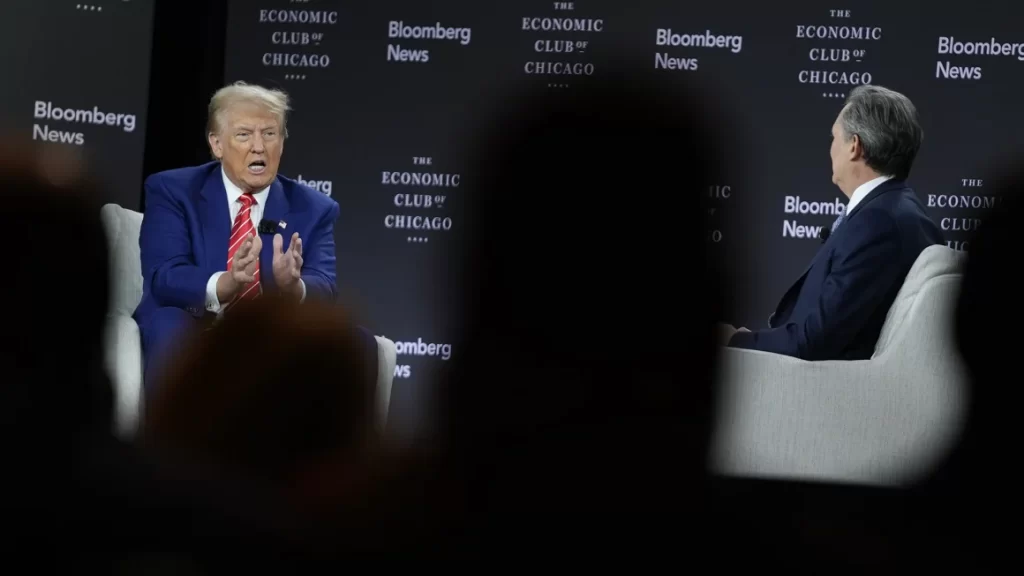Former President Donald Trump’s recent campaign appearances have sparked a mix of intrigue and concern, particularly with his controversial statements that reflect his approach as the presidential election nears. His comments range from discussing military actions against perceived political enemies to meandering discussions about policies like in vitro fertilization (IVF).
One of Trump’s notable assertions was his intent to use the U.S. military against “the enemy from within,” referring to Democrats and his political adversaries. This notion raised eyebrows, especially as he framed it within the context of securing the nation during elections, despite the absence of evidence supporting his fears of chaos on Election Day. Trump has increasingly portrayed his opponents as threats, suggesting that they pose a greater danger than foreign adversaries like China and Russia.
During a recent town hall on Fox News, Trump expressed enthusiasm for a question regarding IVF, branding himself as its “father.” He claimed that Republicans fully support IVF, dismissing concerns that many anti-abortion activists oppose it. Interestingly, he admitted to needing a quick explanation of IVF following Alabama’s Supreme Court’s suspension of access to the procedure, only to later proclaim that Republicans stand firmly behind it.
When asked about the shrinking child tax credit, Trump’s response was vague. He reminisced about his daughter Ivanka pushing for tax credits for mothers, yet he did not commit to reinstating or expanding the child tax credit. Instead, he talked about readjusting the system, which left many wondering what specific changes he would implement.
In another concerning segment, Trump reiterated his belief in an “enemy from within,” indicating a readiness to deploy the National Guard or military if necessary. He specifically called out individuals like Adam Schiff, whom he labeled as a significant internal threat. This rhetoric has drawn criticism for its potential to incite division and unrest.
Trump’s economic proposals have also come under scrutiny, particularly regarding his tax cut plans, which critics claim would add significantly to the national debt. When pressed about how he would fund these cuts, Trump dismissed expert opinions, claiming they “don’t know” what they’re talking about. He confidently stated that tariffs would lead to a manufacturing boom, a claim many economists dispute, arguing that such taxes would ultimately fall on consumers.
Trump’s views on tariffs are strikingly simplistic. He suggested that imposing extreme tariffs on Chinese goods could prevent them from entering the U.S. market, alluding to the idea that merely threatening high tariffs would deter imports. This oversimplification raises questions about the practical implications of such policies and their potential impact on American consumers.
In a recent interview, Trump criticized the credibility of mainstream financial publications, asserting that they have been wrong about economic matters. He positioned himself as more knowledgeable than the experts, further reflecting his pattern of rejecting widely accepted data and analysis.
On the topic of international relations, Trump spoke about his past dealings with Russian President Vladimir Putin, refusing to clarify whether he had been in contact with him since leaving office. Instead, he framed any such relationship as beneficial, downplaying the complexities of U.S.-Russia relations.
Trump’s commentary also touched on the current state of the U.S., which he described as a “developing nation.” He expressed disdain for past administrations, suggesting they failed to hold China accountable for its trade practices. This narrative plays into his larger theme of American exceptionalism, despite his focus on the country’s struggles.
Throughout his campaign events, Trump has displayed a penchant for weaving together disparate thoughts, a style he refers to as “the weave.” This approach often leaves listeners grappling to connect his various points, as he jumps from one topic to another without clear transitions.
Trump’s recent remarks reveal a blend of bravado and confusion, showcasing his views on governance, economics, and national security. As the election approaches, these comments not only illustrate his campaign strategy but also highlight the potential consequences of his rhetoric on the political landscape and societal divisions.









